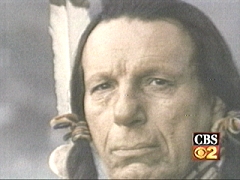The market for Native Americana
Home of the BraveSome people, Indians as well as non-Indians, will always prefer Ted Perry's version of Seattle's speech to Seattle's. And some will find the Black Elk of John Niehardt's book preferable to the intriguing, complex Nick Black Elk. In other words, some will prefer white inventions of Indians preferable to the real thing. There will always be a market for both nostalgia and fantasy. The cottage industry of Native Americana, formerly the province of hippies and enterprising opportunists has become mainstream and professional. Today in the average chain bookstore in the United States most of the Indian titles are in the New Age section. Well-meaning feminists conduct Indian rituals, and the men's movement has appropriated Indian drumming for their get-togethers. The myth-making machinery that in earlier days made us out to be primitive and simple now says we are spiritually advanced and environmentally perfect. Anything, it seems, but fully human. Over time these cartoon images have never worked to our advantage, and even though much in the new versions is flattering, I can't see that in the long run they will help us at all.
The victory of these new stereotypes and our seduction by them has serious implications for contemporary Indian life. In the old days; by this I mean fifteen or twenty years ago there was a sense of irony and distance between whatever Hollywood, or hippies or anyone else thought of Indian life. That seems to have all but disappeared, and many of us seem to have settled for the jukebox spiritualism of a manufactured image that in truth is just a retooled, updated version of the old movies we all used to laugh at.


No comments:
Post a Comment